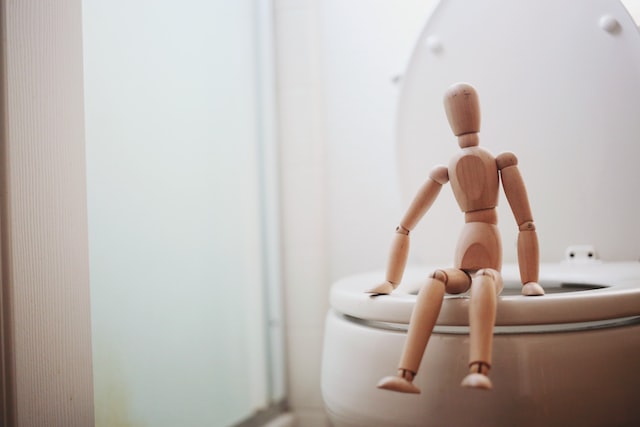
Poop, sometimes known as feces, is the residual of your food and drink after they have been absorbed by your body. You’re not alone if you’ve ever felt lighter and less bloated after a bowel movement.
Although it may not seem like it, you actually do lose weight when you poop.
Does pooping help you lose weight?
Pooping may not seem like it would help with weight loss, but in reality, it can be a very important part of the process. When you poop, your body is able to get rid of food that it couldn’t digest, as well as water and toxins.
This process helps to lighten the load on your digestive system, which can help you lose weight in the long run.
In addition, pooping helps to stimulate peristalsis, which is the movement of food through your digestive system.
By keeping things moving along smoothly, you’re less likely to experience problems like constipation or diarrhea, both of which can lead to weight gain.
So if you’re looking to slim down, don’t forget to give your digestive system a little TLC.
Read also: What Is the Effect If You Holding Your Pee for Too Long
How much weight do you lose when you poop?
While the amount of weight you lose from pooping will vary depending on a number of factors, the average person eliminates about 1 pound (0.45 kg) of waste per day.
This includes not only feces but also urine and other waste products.
Your digestive system is responsible for breaking down the food you eat and extracting nutrients from it. The indigestible parts of food, along with fluids, are eliminated as waste.
Your colon then absorbs water from this waste, and the rest is passed as stool (feces).
Certain foods can contribute to more stool production, including high-fiber foods, fatty foods, and dairy products. In general, the more you eat, the more weight you’ll lose from pooping.
On the other hand, if you’re not eating enough or if you’re not digesting your food properly, you may have trouble eliminating waste.
If you’re trying to lose weight, pay attention to your poop habits. Pooping regularly is a good sign that your digestive system is functioning properly.
If you’re not pooping regularly or if your stool is very hard or very soft, it may be a sign that you need to make some changes to your diet or lifestyle.
Consult with a doctor or registered dietitian if you’re concerned about your poop habits.
Read also: What would happen if you live in complete darkness
How digestive system process food into waste?
The digestive system is a complex but fascinating workhorse, responsible for breaking down food into its nutrients and waste products. Here’s a simplified breakdown of its journey:
Mouth
- Chewing breaks down large food pieces into smaller ones, increasing the surface area for digestive enzymes to work their magic.
- Saliva mixes with food, starting the breakdown of carbohydrates with salivary amylase.
Esophagus
The chewed-up food, now called a bolus, travels down the muscular tube called the esophagus through rhythmic contractions (peristalsis).
Stomach
- The stomach acts like a muscular churner, mixing the bolus with powerful digestive juices containing stomach acid and pepsin, further breaking down proteins and fats.
- The mixture, now called chyme, becomes acidic and semi-liquid.
Small intestine
- The chyme enters the small intestine, where most of the nutrient absorption happens.
- The pancreas releases enzymes to break down carbohydrates, proteins, and fats further.
- The liver releases bile, which helps emulsify fats for easier absorption.
- The small intestine wall contains tiny finger-like projections called villi, which increase surface area for nutrient absorption.
- Absorbed nutrients are transported to the bloodstream.
Large Intestine
- The remaining indigestible material, including fiber, water, and dead cells, moves into the large intestine.
- Water is absorbed from the waste, making it more solid.
- Gut bacteria play a vital role in breaking down some components and producing vitamins.
Rectum and anus
The waste product, now called stool, is stored in the rectum until a bowel movement triggers its release through the anus.
Do you burn calories while pooping?
The answer to this question is a bit complex, as it depends on a number of different factors.
For example, the amount of energy you expend while pooping will differ based on your body size and how much waste you’re eliminating.
In general, individuals who are larger will burn more calories while pooping than those who are smaller. Additionally, the speed at which you poop can also affect the number of calories burned.
Those who eliminate waste quickly will burn fewer calories than those who take their time. Finally, the type of food you consume can also play a role.
Those who eat a lot of fiber will likely burn more calories while pooping than those who don’t.
In conclusion, there is no simple answer to this question. The number of calories burned while pooping will depend on a variety of individual factors.
However, in general, larger individuals who eliminate waste slowly and eat a lot of fiber will burn the most calories while pooping.
Similarly, if you’re eliminating a lot of waste, you may also burn more calories.
Read also: What Happens to Your Body When You Stop Smoking

How often should you poop?
There is no one-size-fits-all answer to this question, as everyone’s digestive system is different. However, most experts recommend that adults poop at least once a day.
If you’re not pooping regularly, or if you’re straining to do so, it could be a sign of a problem. Consult with a doctor or registered dietitian if you’re concerned about your poop habits.
Pooping is an important part of digestive health.
It helps to get rid of food that your body can’t digest, as well as toxins and excess water.
Pooping also helps to stimulate peristalsis, which is the wave-like movement of your digestive system that helps to move food through your intestines.
If you’re not pooping regularly, or if you’re having trouble doing so, there are a few things you can do to help get things moving.
Make sure you’re drinking plenty of fluids.
It is important to make sure you are drinking plenty of fluids when you are constipated.
This will help to soften your stool and make it easier to pass. Water is essential for proper digestion, and it can help to break down the food in your intestine so that it can be more easily absorbed.
You may also want to try a clear liquid diet for a day or two to help ease your constipation. This means consuming only clear liquids, such as water, broth, and sports drinks.
Avoid beverages with caffeine or alcohol, as these can dehydrate you and make your constipation worse.
Eat a high-fiber diet.
Eating a high-fiber diet is important for many reasons. It helps to add bulk to your stool and keeps things moving through your digestive system.
This can help to prevent constipation and other digestive problems. Fiber is also known to reduce the risk of heart disease and other chronic conditions.
There are two types of fiber: soluble and insoluble.
Soluble fiber dissolves in water and is found in oats, beans, and apples. Insoluble fiber does not dissolve in water and is found in wheat bran, nuts, and vegetables.
Both types of fiber are important for maintaining a healthy digestive system.
Get regular exercise.
Exercise helps to stimulate peristalsis and can also promote a healthy weight, which is important for good digestive health. Exercise also helps to reduce stress, which can be a trigger for constipation.
Try to get at least 30 minutes of exercise most days of the week. If you are not used to exercising, start slow and gradually increase your activity level.
Try over-the-counter laxatives.
There are many different types of laxatives available over the counter. These include stool softeners, fiber supplements, and enemas.
Some of these products may not be suitable for long-term use, so it is important to read the labels carefully and follow the directions.
If you are unsure about which product to use, talk to your doctor or pharmacist.
Read also: What Will Happen To Your Body When You Drink Alcohol
Is pooping an effective weight loss strategy?
Pooping may help you to lose weight in the short term, but it is not a sustainable or healthy weight loss strategy.
If you are trying to lose weight, focus on making long-term lifestyle changes, such as eating a healthy diet and getting regular exercise.
These changes will help you to lose weight safely and keep it off in the long term.
Read also: What Is The Benefits Of Cold Showering For Your Health
The bottom line
Pooping is an important part of digestive health. If you’re not pooping regularly, there are a few things you can do to help get things moving.
These include drinking plenty of fluids, eating a high-fiber diet, and getting regular exercise. You may also need to try over-the-counter laxatives.
Pooping is not an effective weight loss strategy, but making long-term lifestyle changes can help you to lose weight safely and keep it off in the long term.



